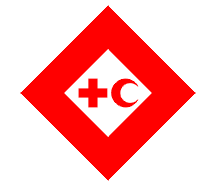“DECISION 22 Support to National Societies most in
need of improving their capacity” refers to “Households headed by women” among particularly
vulnerable groups.
“DECISION 23
Women in
Red Cross/Red Crescent Development
The General Assembly,
Recalling Decision 33 of the Vllth Session of the
General Assembly in 1989, and the endorsement of the Plan of Action on Women in Red Cross/Red Crescent Development,
Increasingly concerned about the vulnerability of women and children in situations of deprivation,
including disasters,
Aware of the often weak economic, social and legal
position of women, aggravated by the
current adverse socio-economic conditions,
Concerned about the continued use of harmful traditional
practices threatening the lives of women,
Recognising that women’s
hard life in the countryside and in urban slums is not only a question of basic
injustice, but also an impediment to economic and social development,
Urges all National Societies and League
representatives responsible for the implementation of development programmes
to:
- consider
women as a
major target group for Red Cross/Red Crescent development programmes;
- ensure
that the role of women in situations of disaster is being taken into account
adequately;
- put
emphasis on community-based primary health care, including child spacing.
family planning and clean water supply. in order to meet some of the most
urgent needs of women and children;
- review
ongoing health activities, particularly first-aid training. to ensure that they
cater to the needs of the most vulnerable;
- ensure
that literacy and other training schemes for women daily concerns and aim at improving are linked to
their lives;
- promote
income generation activities for women,
and ensure that such projects are economically viable and become independent of
subsidies from the National Societies;
- embark
upon labour-saving development projects for women,
giving high priority to water and fuel supply, child care, agriculture and food
processing.
“DECISION 31 AIDS: a continuing Challenge for the
League” contains the following paragraph:
“Aware of the continuing need for information and
education, for programmes to prevent HIV sexual transmission and HIV transmission among intravenous
drug users and for measures to ensure the safety of blood supplies and adequate
sterilization of medical equipment to prevent the spread of HIV,”
“DECISION 32 First Aid” contains a paragraph
mentioning women:
“Encourages all National Societies to consider both
the physical and psychological emergency needs of vulnerable people and to
ensure that their first-aid training programmes focus on the varying needs of
different groups (eg. children, young people, women and the elderly) and of people in different
situations (eg. urban, rural, industrial),”
“DECISION 33
Health of Women and Children
The General Assembly,
Recognizing the major contributions that many Red
Cross and Red Crescent Societies have made to improving the physical, mental
and social well-being of women and
children around the world,
Recalling that, in addition to General Assembly
Resolutions on primary health care (1981 and 1986), a number of Decisions have
been adopted by the General Assembly· which focus on improving the health of
children (1983, 1985, 1986), young people (1989) and the health and development
of women (1989),
Concerned about the many factors which continue to
undermine the health of children and women,
particularly mothers, and about their continuing vulnerability which is a major
focus for the League1s Strategic Work Plan for the Nineties,
Aware that women
and children frequently suffer disproportionately during armed conflicts,
disasters and population displacements, and are likely to be particularly
seriously affected by the negative impact of structural adjustments, national
debt repayment, and continuing expenditure on armaments,
Aware that much of the disease, disability and death
of women and children could be prevented
or alleviated through the implementation of simple, available, low cost
interventions, and that there is an urgent need to improve their access to
health services, including family planning and education, in line with the
Recommendations of the World Conference on Education for All,
Recognizing the important contributions that National
Societies could make, in terms of advocacy and action, to support the World
Summit for Children’s Declaration and Plan of Action for the Survival,
Protection and Development of Children,
Recognizing the potential that National Societies have
to contribute to the Nairobi Strategy for the Advancement of Women, and to mobilize for the ratification and
implementation of the Convention on the Rights of the Child and the Convention
on the Elimination of all Forms of Discrimination against Women,
Cognizant of the need for a holistic and integrated
approach to the health of children, women and men, based on the primary health
care approach, and aware of the importance of promoting and supporting the
goals of the forthcoming International Year of the Family (1994),
Urges all National Societies to encourage their Heads
of State and Government to ratify and implement the UN Convention on the Rights
of the Child and the UN Convention on the Elimination of All Forms of
Discrimination against Women, and to
contribute towards and monitor the attainment of the specific targets of the
Plan of Action of the World Summit for Children and the Nairobi Strategy for
the Advancement of Women,
Urges all National Societies to strengthen and develop
advocacy and activities that focus on improving the physical, mental and social
well-being of children and the health and development of women through
sustainable community-based programmes which help to decrease vulnerability,
Urges all National Societies to continue to cooperate,
collaborate, and develop networks and respectful partnerships with governments,
other NGOs and relevant inter-governmental organizations in order to improve
the health of women, children and young people,
Requests the Secretary General to assist National
Societies through sharing information, developing human and other resources and
strengthening international cooperation with inter-governmental organizations
and other NGOs and to continue to take a leadership role in the follow-up to
the World Summit for Children.
